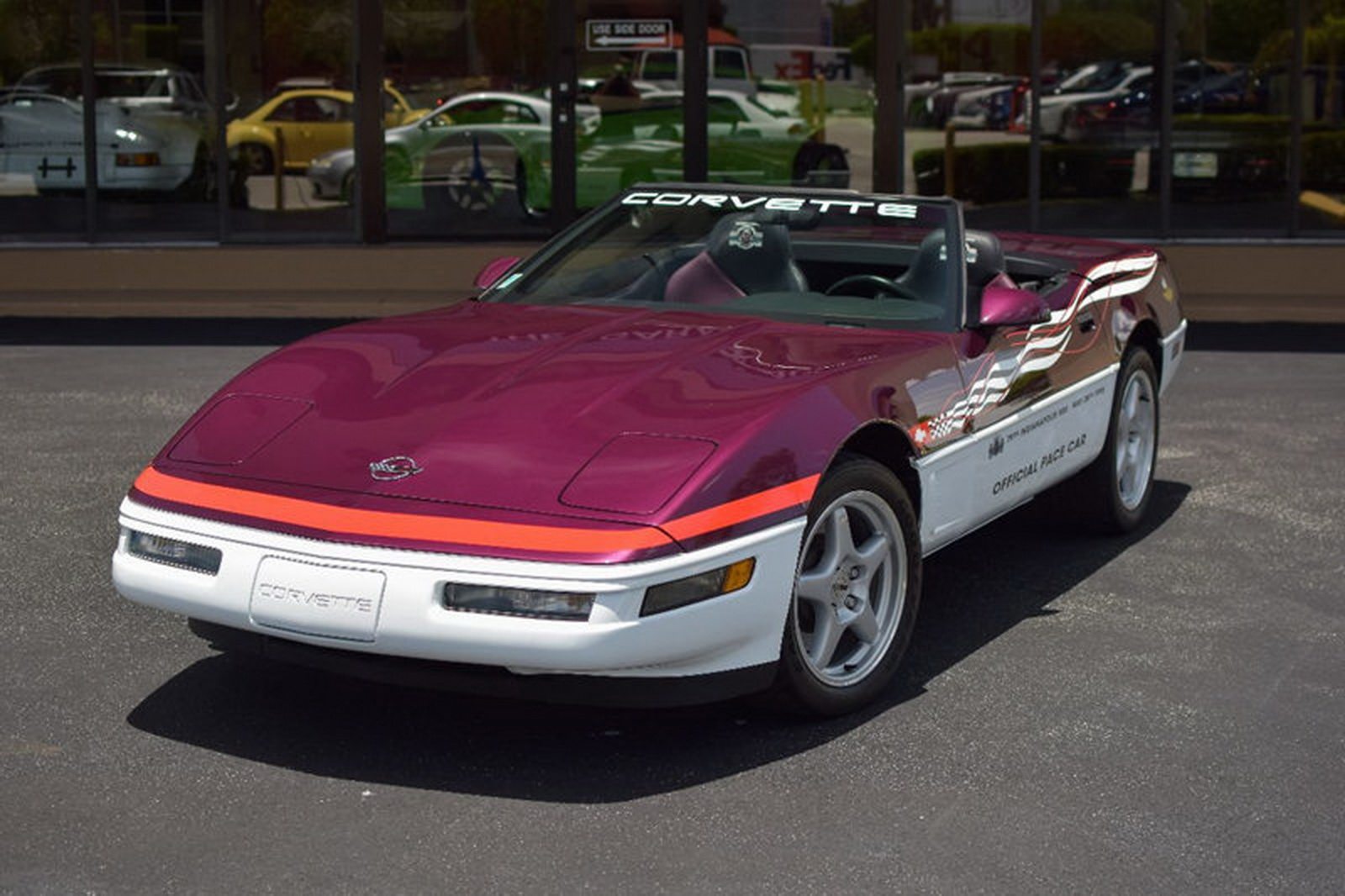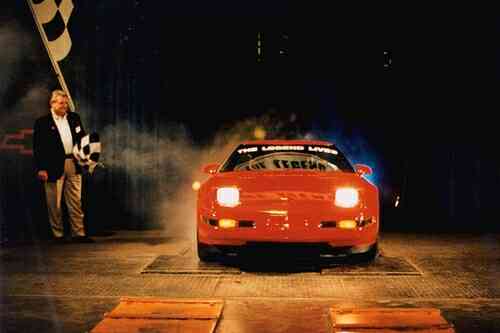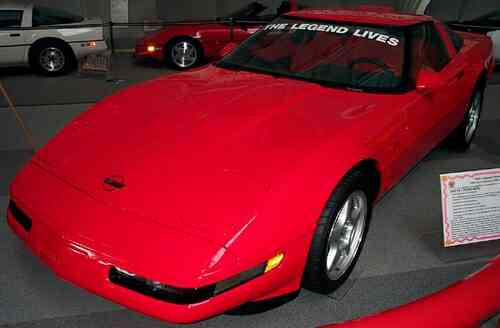1995 Corvette Black Painted Wheel Pics
Last updated:
1995 Corvette Overview
Even with eleven years already behind it, the C4 Corvette still managed to receive the accolades of enthusiasts and critics alike. It received praise for its jaw dropping acceleration and equally for its intense road grip and superior handling. However, with the announcement that an all-new, fifth generation Corvette was under development and on track for the 1997 model year, there were few who were surprised by Chevrolet's decision to make minimal changes to the existing C4 Corvette coupe and convertible, and to completely eliminate the ZR-1 early in the 1995 production year.
| Model: | 1995 Corvette |
| Generation: | C4 Corvette |
| Type: | 2 Door Coupe, 2 Door Convertible |
| Available Colors: | Dark Purple Metallic, Dark Purple/White, Arctic White, Admiral Blue, Black, Bright Aqua Metallic, Polo Green Metallic, Competition Yellow, Torch Red, Dark Red Metallic |
| Engine: | 350CI, 300 Horsepower, Multi-Port Fuel Injected LT1 V8 Small Block Engine. |
| VIN: | 1G1YY22P7S5100001 – 1G1YY22P7S5120294 (Corvette Coupe & Convertible) 1G1YZ22J0S5800001 – 1G1YZ22J0S5800448 (ZR-1 Corvette) |
| Transmission: | 4-speed automatic (standard), 6 speed manual (optional) |
| Original Price: | $36,785.00 (Coupe), $43,665.00 (Convertible) |
| Units Produced: | 20,742 |
| Specs: | 1995 Corvette Spec List |
Despite its long and successful run, the years of the C4 Corvettes were drawing to a close. Much of the Corvette design and engineering teams would now be actively engaged in testing the next generation sports car so, for its second-to-last model year, the 1995 C4 Corvette received only minor enhancements.

That's not to say that there weren't any changes made to the 1995 Corvette. Mechanically, the already robust LT1 engine received additional refinements.
The connecting rods were revised to improve strength and weight uniformity, the engine fan was made quieter, and the fuel injection system was improved to utilize alcohol-blend fuels, which began to have an increased appearance at gas pumps around the world at about that same time. Additionally, the new fuel injectors were developed to reduce fuel dripping when the engine was turned off.
Beyond the engine, additional mechanical improvements were also made to the drive train and other areas of the car. The electronically controlled four-speed automatic transmission was refined to provide smoother shifting, and the torque converter was made stronger and lighter.
The six speed manual transmission was also upgraded to include a high-detent operation (which took the place of the 1994 Corvette's reverse lockout) for easier operability. Heavy-duty ZR-1 brakes were made standard on all models, and every model also received a brand new Bosch V ABS (Anti-lock brakes) Traction Control System. This system would reduce wheel slippage by controlling the brakes during driving conditions where control of the vehicle might be compromised. Models equipped with the base suspension now had lower front/rear spring rates. All 1995 Corvettes also received a ride improvement with the introduction of the less-stiff DeCarbon gas-charged shocks.

Cosmetically, the changes to the Corvette's exterior really were very few, though those that were made did help to distinguish the 1995 model from earlier years. On the exterior, the single most notable modification was the redesigned fender vents which now featured more of a fish "gill" appearance.
Whereas the 1994 model year had recessed slats behind its front wheel, the '95 model was much more refined, with a slightly flared cowling around the vents. Beyond this single physical change, the only other cosmetic differences involved the introduction of a new paint color – Dark Purple Metallic, which replaced the depleted Copper and Black Rose metallic paints
Inside the interior, the changes were equally few. The sports seats received an upgrade that now utilized "French" seam stitching. These French seams were introduced in response to the damage many of the leather seats in the earlier model C4's received, most especially on the seat bolsters. Torn leather had become an increasingly common problem amongst consumers of the C4 Corvette, and so this response to address the tearing issue was well received.
DID YOU KNOW: At 1:12 p.m. on Friday, April 28, 1995, Chevrolet's Bowling Green assembly line was momentarily halted to honor the passing of the C4 ZR-1 Corvette. While the last ZR-1 Corvette had actually been built the previous Monday, the final car was paraded off the line that afternoon with plant manager Wil Cooksey and UAW member Billy Jackson on board. Chevrolet General Manager Jim Perkins oversaw the roll off of this final ZR-1, then, with checkered flag in hand, took the wheel of the Torch Red coupe and drove it across the street, accompanied by retired Corvette Chief Engineer David McLellan, to the National Corvette Museum.
Aside from the stitching, all of the other modifications to the interior were invisible or carefully concealed away. The CD player was given a stronger mounting bracket to prevent skipping. Several adhesive-fabric straps were installed in key places around the cabin to help reduce rattles, (a problem that is commonplace to most Corvette owners.)
One interesting change that was introduced in the 1995 model year was the introduction of an option that actually deleted equipment off of the car. While the concept itself was nothing new, it was the direct result of the 1994 Corvette's road successes that Chevrolet decided to introduce RPO N84. Since the available extended-mobility tires effectively eliminated the need for any type of spare tire, it was decided that those Corvette owners who purchased the optional run-flat tires could delete the spare tire and receive a $100.00 credit.

Another special-edition Corvette was made available in 1995. After a near-stock LT1 Corvette Convertible paced the Indy 500 in 1995 – which was only the third time Corvette had ever been bestowed with this honor – Chevrolet decided to commemorate the occasion by producing a specially optioned Pace Car Replica. Option RPO Z4Z was offered to consumers at an extra cost of $2816 and was limited to convertibles.
In the 1995 running of the 24 Hours of LeMans, the Corvette racing teams would dominate the Porsche teams in both qualifying and finishing results. While the overall victory would end up going to a McLaren F1 GTR, The #001 Corvette (driven by Enrico Bertaggia, Johnny Unser, and Frank Jelinski) would finish 9th overall after starting 37th. Additionally, the #3 Callaway Corvette (driven by Robin Donovan, Eugene O'Brien, and Rocky Augusta), would finish 11th after starting 39th.
The upgrades to the car included Dark Purple Metallic paint layered over Arctic White paint.. The car featured an all-white convertible top, specially embroidered headrests, and unique graphics and trim. Additionally, the special edition "A-mold" tires that were introduced on the ZR-1 in 1990 were utilized on this special edition Corvette as well. In all, 527 Pace Car Replicas were built, with 87 of them being shipped off to the Indy 500, 20 of them being shipped overseas and the remaining 415 being distributed to Chevrolet's top performing dealers across the United States.

With regards to pricing, the 1995 Corvette's base price increased slightly over the 1994 model. In 1995, the Corvette coupe sold for $36,875 while the convertible sold for $43,665. While the ZR-1's pricing remained unchanged in 1995, only 448 units of the "King of the Hill" were sold in 1995.
The last C4 ZR-1 was driven off the assembly line on April 28, 1995, resulting in a total number of 6,939 units being built during its six year production run. As for the base coupe and convertible, the total sales numbers decreased to 20,742 units for the model year – even after dealerships began discounting prices to try and entice more buyers to purchase a 1995 Corvette.

At a dinner event commemorating the passing of the ZR-1 Corvette, Jim Perkins, Chevrolet's General Manager, explained that the short lived ZR-1's existence was the result of too much sales competition between the aforementioned supercar and its "little" brother – the LT1 coupe.
Additionally, Perkins also stated that it would be cost prohibitive to make the ZR-1 meet the 1996 model year's tightened emissions standards. This decision had actually been under strong consideration since September, 1991, suggesting that the ZR-1's had always been slated for a short life expectancy.
However, it was reported that Lotus engineers had begun work in 1991 on an improved LT5 engine that would have produced between 450 and 475 horsepower.
Whatever the ultimate reason for discontinuing the ZR-1 – a report in AutoWeek summed the supercar up perfectly. It read as follows: "Forget about the detractors or the sales numbers.
With rocket-sled acceleration, mastiff grip, and right-now brakes, the ZR-1 has the largest performance envelope of any mass-produced American car ever built. It also has the amenities and acceleration of a modern passenger car and none of the temperament of a race car. With a slight tailwind, it will go 180 miles per hour, but it will also trudge through gridlock (traffic) without complaint, A/C on kill and CD player on loud. We may never see the likes of it again."
In 1995, the "King of the Hill" ended its reign and became part of history."LONG LIVE THE KING!"
1995 Corvette Image Gallery
See full1995 C4 Corvette Image Gallery
1995 Corvette Specifications
See the complete breakdown of technical specifications for the 1995 Corvette, including engine, suspension, brakes, body dimensions, and power.
Read more: 1995 Corvette Specifications.
1995 Corvette Pricing & Options
| CODE: | DESCRIPTION: | QUANTITY: | RETAIL PRICE: |
| 1YY07 | Base Corvette Sport Coupe | 15,771 | $36,785.00 |
| 1YY67 | Base Corvette Convertible | 4,971 | $43,665.00 |
| AG1 | Power Driver Seat | 19,012 | $305.00 |
| AG2 | Power Passenger Seat | 15,323 | $305.00 |
| AQ9 | Sport Seats | 7,908 | $625.00 |
| CC2 | Auxillary Hardtop (convertible) | 459 | $1,995.00 |
| C2L | Dual Removable Roof Panels (coupe) | 2,979 | $950.00 |
| 24S | Removable Roof Panel, blue tint (coupe) | 4,688 | $650.00 |
| 64S | Removable Roof Panel, bronze tint (coupe) | 2,871 | $650.00 |
| FX3 | Selective Ride and Handling, electronic | 3,421 | $1,695.00 |
| G92 | Performance Axle Ratio | 10,056 | $50.00 |
| MN6 | 6-Speed Manual Transmission | 4,784 | $0.00 |
| NG1 | New York Emission Requirements | 268 | $100.00 |
| N84 | Spare Tire Delete | 418 | -$100.00 |
| UJ6 | Low Tire Pressure Warning Indicator | 5,300 | $325.00 |
| U1F | Stereo System With CD, Delco-Bose | 15,528 | $396.00 |
| WY5 | Tires, Extended Mobility | 3,783 | $70.00 |
| YF5 | California Emissions Requirement | 2,026 | $100.00 |
| Z07 | Adjustable Suspension Package (coupe) | 753 | $2,045.00 |
| Z4Z | Indy 500 Pace Car Replica (convertible) | 527 | $2,816.00 |
| ZR1 | Special Performance Package (coupe) | 448 | $31,258.00 |
Read more: 1995 Corvette pricing and factory options.
1995 Corvette Vehicle Identification Numbers (VIN)
For all 1995 Corvettes, the Vehicle Identification Number was stamped on a plate on the inner vertical surface of the left windshield pillar visible through the windshield. Read more: 1995 Corvette VINs.
1995 Corvette Recalls, Technical Service Bulletins, & Maintenance Schedule
The information contained on this page is for reference only. The time and mileage intervals for each of the maintenance items included on this page were established by General Motors with the introduction of the 1995 Chevy Corvette. Please note that the original service intervals may not reflect the standard service intervals used in current automobile engines.
Read more: 1995 Corvette Recalls, Technical Service Bulletins, & Maintenance Schedule.
1995 Corvette Common Issues
The following list of common issues is intended for individual reference only, and may not reflect the specific issues of every 1995 Corvette. This information comes from a variety of sources including the NHTSA Defects Reports pages. While the intent of this page is to identify the common issues pertaining to the 1995 Corvette, it is not an all-inclusive list and should be used for reference only.
Read more: 1995 Corvette Common Issues.
1995 Corvette Dealers Sales Brochure & Service Manual
See the original 1995 Corvette sales brochure and service manual here.
1995 Corvette Black Painted Wheel Pics
Source: https://www.corvsport.com/1995-c4-corvette/
0 Response to "1995 Corvette Black Painted Wheel Pics"
Post a Comment